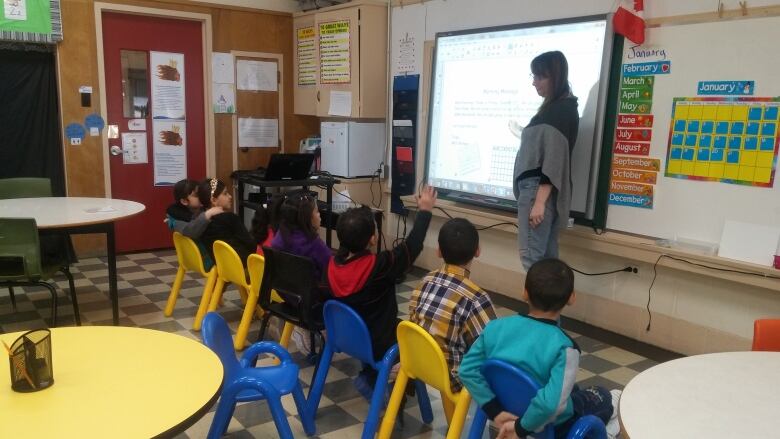Syrian students 'eager to learn' at Saint John language centre
Students have attended school in a special classroom at Prince Charles School for the past week

Young Syrian newcomers to Saint John are quickly picking up the English language, not even a full week after starting classes atthe Saint John Language Learning Centre.
Ten students between the ages of 5and 19 started their English language studies on Monday at Prince Charles School, which was chosen for its central location and available space.
Monica Watson-Bedard, a classroom teacher at the centre, says the students "are little rock stars," andare adapting to the language at a fast pace.
"It's hard to believe that in less than a week, they are already asking, 'May I go to the bathroom? May I get a drink? Hi, my name is,'" Watson-Bedard said on Thursday.
"They are eager to learn, eager to participate, they are quite comfortable because they have other people who speak their language in their classroom, so that's made a huge impact on their ability to feel comfortable enough to take the risk to speak English regardless of their age."
The students are getting help from a translatoralso astudent, who comes to the classroom before and after his own classesand they're learning through songs and games.
Watson-Bedard admits the lively instruction can sometimes be exhausting.
"There's a lot of get up, dance, sing around, point, move, it's not a lot of sit down and let the kids work independently," she said.
"Because they're not independent yet, so it requires a lot of energy."
The students have been quick to pick up on Arabic words that are used in English, Watson-Bedard says, such as boots, jacket, kiwi, computer, video and ice cream.
Another ten students are expected to start on Monday, and by the following week,educators expect enrolment to climb to approximately 40 students.
"We are flexible, we can respond as needed, so as we see the need increase we'll respond accordingly," said Jeff Matheson,a support teacher in the EAL program.
Matheson was part of the first teams to welcome Syrian refugees to Saint John last December. He was matched with a new family and visits them regularly.
"I feel they've given me more than I've given them and I've learned probably 20-30 words of Arabic And it's been the most amazing cultural experience for my family, and for my friends and colleagues," Matheson said.
"To see them in the school has been one of the most rewarding experiences of my education career and my life so far."
For some children,the stay at the language centre will be short. Others,especially those in need of intensive language instruction, will spend longer there.
Tina Doiron-Wilson, an EAL mentor at the language centre, says many of the children haven't had an opportunity to go to school for years.
"So what we're seeing is energetic, enthusiastic students wanting to show us everything they've learned," she said.
"It has been the most positive experience of my teaching career, beyond a doubt."
Watson-Bedardsays there'sbeen an outpouring of support from the community for the newcomersjust the other day,a professor from UNB Saint John dropped offiPadsfor the students to use.
Prince Charles School has been a partner on the language centre initiative, along with the Saint John YMCANewcomer Connections group, and Anglophone District South.
The district has provided two psychology workers to support the classroom.
Staff at the centre perform a series of assessments on each child to determine their education needs, language capacity, and emotional and mental health.












_(720p).jpg)


 OFFICIAL HD MUSIC VIDEO.jpg)
.jpg)



























































































